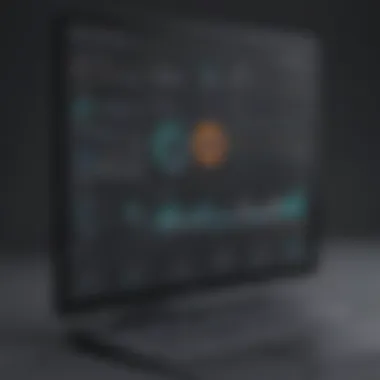Transforming Property Management with Rent Apps


Intro
In recent years, mobile applications designed for rent management have gained significant traction, especially among small to medium-sized businesses dealing with property management. These applications create pathways to streamline various processes and enhance communication. They also offer operational improvements that are vital in a competitive market. This article examines these applications thoroughly, providing insights into their functionality, advantages, and the challenges businesses might face during their adoption.
Software Overview
Definition and Purpose of the Software
Rent management mobile applications are tools specifically designed to assist property managers and landlords in handling day-to-day rental operations. These applications facilitate various tasks such as tenant communication, invoice processing, payment tracking, and maintenance coordination. The primary purpose is to simplify the management process, making it more efficient and user-friendly. By utilizing technology, property managers can reduce the time spent on manual tasks and focus on more critical aspects of their business.
Key Features and Functionalities
The functionality of rent management mobile applications often includes a diverse range of features that cater to the needs of property managers. Here are some of the most prominent ones:
- Tenant Communication: Facilitates seamless interaction between landlords and tenants through messaging and notification systems.
- Payment Processing: Enables secure online payments, significantly reducing the reliance on checks and cash transactions.
- Maintenance Requests Management: Allows tenants to submit maintenance requests through the app, streamlining the response process for property managers.
- Document Storage: Provides a secure location for storing important documents such as lease agreements and inspection reports.
- Reporting and Analytics: Offers insights into property performance, helping managers make informed decisions based on data.
These features minimize operational risks and lead to a more organized management structure, ultimately enhancing both tenant satisfaction and the overall efficiency of property management.
Comparison with Alternatives
Overview of Competitors in the Market
Several companies have developed their own rent management solutions that compete in the market. Notable names include AppFolio, Buildium, and Rentec Direct. Each of these applications offers unique features aimed at enhancing property management.
Key Differentiators
In a crowded space, certain characteristics set these applications apart. For instance, AppFolio focuses heavily on mobile accessibility and user experience, whereas Buildium offers advanced accounting features that appeal to larger property management firms. Rentec Direct, on the other hand, emphasizes its strong security measures, making it an attractive option for businesses that prioritize data protection.
Understanding these differentiators is essential for stakeholders evaluating which solution will best meet their business needs.
"Selecting the right rent management application can lead to significant improvements in operational efficiency."
Intro to Rent Manager Mobile Apps
The rise of mobile technology has transformed many industries, including property management. Rent manager mobile apps are vital tools for property managers seeking to improve their operational efficiency. The importance of these apps can be outlined in several ways. First, they offer a centralized platform where property managers can oversee various aspects of property management. This includes tenant communication, lease tracking, and payment processing. By using these applications, property managers can significantly reduce administrative burdens, allowing them to focus on strategic decisions instead of day-to-day tasks.
Second, rent management apps enhance transparency between landlords and tenants. Both parties gain access to real-time information about payments, maintenance requests, and other essential updates. This openness can lead to improved relationships and more effective conflict resolution. Furthermore, mobile accessibility ensures that property managers can manage their operations from anywhere, increasing flexibility and responsiveness.
Lastly, as the demand for rental properties grows, the competition among property managers intensifies. Utilizing mobile applications can give businesses a competitive edge. By streamlining operations and enhancing service delivery, these apps can contribute to higher tenant satisfaction and retention rates.
Defining Rent Manager Mobile Applications
Rent manager mobile applications are software solutions designed for property managers to effectively manage rental properties through mobile devices. These applications typically include a suite of tools catered to everyday management needs. Features often encompass tenant and lease tracking, payment collection, and maintenance management. With smartphones and tablets being ubiquitous, these applications enable property managers to handle tasks on-the-go. The core function of these apps is to simplify complex operations and improve the overall renting experience for both managers and tenants.
A pay-per-use model is common among rent management apps, making them accessible to small and medium-sized enterprises. This financial structure allows businesses to adopt these solutions without significant upfront investment, an attractive proposition for many entrepreneurs. Additionally, many rent manager mobile applications integrate with accounting software and other business tools, ensuring seamless operation across systems.
Evolution of Property Management Software


The evolution of property management software reflects the rapid advancements in technology and the shifting needs of the rental market. In the past, property management relied heavily on paper-based processes. This approach was tedious and prone to errors. The advent of basic computer software marked the first significant change in streamlining property management tasks. However, these early solutions lacked mobility and accessibility.
As the need for real-time data and remote access increased, more sophisticated solutions emerged. Cloud computing technology enabled property managers to store and access data from anywhere, at any time. This shift made property management applications not only more efficient but also more aligned with the demands of modern businesses. The introduction of mobile applications followed naturally, aiming to meet the needs of on-the-go property professionals.
Today, the market features numerous advanced rent management applications. Each offers unique functionalities, such as automated reminders for rent collection, digital maintenance requests, and tenant portals. The evolution continues as technologies such as artificial intelligence and machine learning push these applications to provide even more analytical insights and automation. As the property management landscape evolves, the reliance on intuitive, flexible mobile applications is likely to grow.
Key Features of Rent Manager Mobile Apps
The functionality of rent manager mobile applications forms the core of their utility in property management. These applications offer various features designed to simplify the complexities inherent in managing rental properties. In this section, we will explore key features that these applications provide, and how they contribute to more efficient management operations.
Tenant Management Functionality
Effective tenant management is essential for property owners and managers. Rent manager mobile applications enable users to maintain detailed profiles for each tenant. This includes personal information, contact details, and rental history. Furthermore, these applications facilitate communication, allowing swift messaging between landlords and tenants. This function improves transparency and fosters a healthy landlord-tenant relationship. The application may also allow tenants to submit feedback or report issues directly. By centralizing this information, property managers can quickly respond to tenant requests and monitor satisfaction levels.
Lease Tracking and Management
Lease tracking and management are significant aspects of property management. A rent manager mobile app enables users to keep track of lease agreements in a systematic manner. This means that tracking when leases are signed, renewed, or expired can be done through automated notifications. Such a feature is particularly useful for avoiding any misunderstandings regarding lease terms. When a lease is close to expiration, the app can send alerts, prompting timely discussions about renewals or adjustments. This approach allows property managers to plan their strategies and negotiate terms effectively.
Payment Processing Capabilities
Payment processing is another essential feature of rent manager mobile applications. These tools streamline the billing process, allowing tenants to pay their rent via various methods such as credit cards or bank transfers. Automating rent collection minimizes late payments and increases cash flow stability for managers. Additionally, the application can generate automatic receipts, providing transparency in transactions. Managing financial data within the app ensures that both tenants and managers can access payment histories whenever needed, refining financial oversight and reporting capabilities.
Maintenance Request Handling
Handling maintenance requests can often be challenging, but rent manager mobile applications offer features for efficient management. Tenants can submit maintenance requests directly through the app, detailing the issue and attaching images if necessary. These applications can categorize requests based on urgency or type, streamlining the process for property managers. Also, it allows for better allocation of resources and more timely resolution of issues. By having a digital trail of requests, managers can analyze patterns over time to identify recurring problems. Consequently, this can lead to improved property upkeep and increased tenant satisfaction.
Overall, leveraging the key features of rent manager mobile applications can greatly bolster the efficiency of property management. These tools not only enhance the operational workflow but also improve communication, tenant satisfaction, and financial health.
Advantages of Using Rent Manager Mobile Apps
Adopting rent manager mobile applications yields significant benefits that can greatly enhance the operations of property management businesses. These advantages encompass various aspects, ranging from improved efficiency to more transparent communication with tenants. Understanding these benefits is crucial for decision-makers aiming to implement these technologies effectively.
Enhancing Efficiency in Property Management
Efficiency is one of the core elements driving businesses to implement rent management mobile apps. These applications minimize the time property managers spend on routine tasks. For instance, they automate functions such as rent collection, lease renewals, and maintenance requests. By reducing manual workloads, staff can focus on strategic initiatives.
Moreover, mobile apps often integrate with existing accounting software. This creates a cohesive environment where financial data is easily accessible. Stakeholders can quickly oversee cash flows and manage budgets, ensuring they are on track to meet their financial goals.
"Efficiency in property management not only increases profitability but also enhances tenant satisfaction, leading to a lower turnover rate."
Improving Communication with Tenants
Communication is pivotal in maintaining positive relationships with tenants. Rent manager mobile applications foster this by providing a streamlined platform for interactions. Through these apps, tenants can easily submit inquiries or maintenance requests at their convenience.
These applications often feature notification systems. Such systems inform tenants of upcoming payment deadlines or property updates. This proactive approach can significantly lower misunderstandings that often arise from delayed communication. Furthermore, effective communication results in faster resolutions of issues, leading to higher tenant retention rates.
Accessing Real-Time Data Analytics


Data is a powerful tool in decision-making. Rent manager mobile apps provide real-time analytics that allow businesses to gain valuable insights into their operations. Managers can track various metrics such as occupancy rates and payment histories.
Analytics enables property managers to identify trends over time. They can assess which properties are performing well or which are falling short. This information allows for more informed strategic planning.
Additionally, the capacity to generate reports on demand helps stakeholders make critical financial decisions swiftly. Integrating such data-driven approaches can lead to optimized management processes and better profitability in the long run.
Challenges in Implementing Rent Manager Mobile Apps
Implementing rent manager mobile applications is not just a matter of installing software. It involves several challenges that organizations must navigate. Understanding these challenges is crucial for stakeholders such as small to medium-sized businesses, entrepreneurs, and IT professionals. These considerations affect the successful integration and utilization of these mobile solutions.
Integration with Existing Systems
One significant challenge is integrating new applications with existing property management systems. Many businesses rely on a mix of older software and manual processes. Compatibility issues can arise when trying to connect new mobile apps with these established systems. The lack of interoperability can lead to data silos, where information is trapped in one system, reducing the efficiency that mobile apps aim to provide.
Effective integration is necessary for ensuring that all property management functions work seamlessly together. Businesses should consider solutions with strong APIs and middleware options to ease this transition. Engaging with tech professionals who understand both the legacy systems and the new mobile technology can also facilitate smoother integration processes.
User Adoption and Training Needs
Another challenge lies in user adoption. Even the most advanced mobile application is ineffective if staff and tenants do not use it. User resistance often stems from the comfort of established procedures. Employees may hesitate to learn a new system, fearing it will complicate their workflow.
To overcome this barrier, companies must invest in training programs. These programs should not only teach employees how to use the app but also highlight its benefits. Demonstrating how features can simplify their tasks will increase the likelihood of adoption. Additionally, ongoing support can help users become more confident in navigating the app efficiently.
Data Security Concerns
Data security is a critical element that cannot be overlooked. Mobile applications often deal with sensitive tenant information, including financial data and personal identification. The risk of data breaches can deter organizations from moving forward with mobile solutions.
To address these concerns, businesses should prioritize apps with strong security protocols. Features such as encryption, regular security updates, and compliance with industry standards should be evaluated. Partnering with providers who have proven track records in data security is vital. By taking these precautions, organizations can safeguard both their data and their tenants' information.
"Understanding the challenges of implementing rent manager mobile apps is essential for a successful transition to digital property management."
In summary, the process of adopting rent manager mobile applications presents various challenges. Integration with existing systems, fostering user adoption, and ensuring data security are all critical concerns. Addressing these issues proactively can lead to successful implementation, benefiting not just the businesses but also the tenants they serve.
Evaluating Rent Manager Mobile Applications
Evaluating rent manager mobile applications is crucial for businesses engaged in property management. This evaluation is a systematic approach aimed at ensuring that the selected application meets specific business needs and objectives. As these applications handle crucial functions such as tenant communication, payment processing, and maintenance management, choosing the right tool can significantly impact operational efficiency and overall success.
The importance of carefully evaluating these applications lies in several key benefits:
- Informed Decision-Making: A thorough evaluation helps stakeholders make educated decisions rather than relying on marketing claims. Considering the unique requirements of diverse properties can guide users toward applications that truly fit their needs.
- Cost Efficiency: Investing in the wrong software can lead to unnecessary expenses over time, including ineffective processes and additional training. A precise evaluation minimizes such risks, ensuring you choose an application that brings value to your operations.
- Enhanced User Experience: User experience plays a pivotal role in adoption rates. Evaluating the interface and usability of applications ensures ease of use for both management and tenants, leading to higher satisfaction levels.
"The right rent management mobile application can transform how a business operates, making evaluation a critical first step in the adoption process."
Identifying Key Performance Indicators
Identifying key performance indicators (KPIs) is an essential part of evaluating rent manager mobile applications. KPIs provide measurable values that demonstrate how effectively a company is achieving its key business objectives. For property management, relevant KPIs might include:
- Tenant Satisfaction Scores: These scores gauge how well tenants feel their needs are being met. Higher scores may indicate that the application facilitates communication and meets service expectations.
- Occupancy Rates: Monitoring occupancy can reflect the effectiveness of the marketing tools within the application. An application that helps maintain high occupancy rates is invaluable.
- Payment Processing Times: This KPI identifies how quickly and efficiently rent payments are processed. Quick processing times enhance tenant experience and ensure steady cash flow for property managers.
- Maintenance Request Resolution Time: Tracking how fast maintenance requests are handled offers insight into operational efficiency. A shorter resolution time typically indicates a more effective management system.


By establishing these KPIs, businesses can objectively assess the impact of the rent manager mobile application on their operations, ensuring that it aligns with broader organizational goals.
Comparative Analysis of Popular Apps
A comparative analysis of popular rent manager mobile applications allows stakeholders to discern which applications are the most effective. This involves looking at several parameters:
- Features Offered: Applications like Buildium, AppFolio, and TenantCloud provide various features. An analysis should compare tenant management, payment processing, maintenance tracking, and reporting capabilities across different platforms.
- Cost Structures: Understanding monthly subscription rates and additional fees aids in comparing the overall financial commitment for each application. Some applications might offer robust features at competitive rates, while others may provide fewer functionalities at higher prices.
- User Reviews and Case Studies: Gathering user feedback from platforms such as Reddit or Facebook can provide insights into real-world applications and their benefits or drawbacks. Users often share their experiences, highlighting practical issues not evident in promotional material.
- Integration Capabilities: Assessing how easily each app integrates with existing systems is vital. Seamless integration minimizes disruptions during the transition to a new platform.
Conducting this analysis can illuminate the strengths and weaknesses of each application, enabling property managers to choose the most suitable option for their needs.
Future Trends in Rent Management Technology
In the rapidly evolving landscape of property management, future trends in rent management technology hold significant potential for small to medium-sized businesses. Embracing these trends is not just about keeping pace but also about leveraging new capabilities for enhanced operational effectiveness. The advancements in technology can provide opportunities for greater efficiency, improvement in service quality, and heightened tenant satisfaction.
Artificial Intelligence and Automation
Artificial intelligence (AI) and automation are transforming the way property management operates. These technologies allow landlords and property managers to automate repetitive tasks, reduce human error, and free up valuable time for more strategic activities.
Key benefits of integrating AI include:
- Predictive Analysis: AI can analyze tenant behavior to forecast trends. Understanding when tenants might face challenges with payments can lead to proactive measures, ultimately reducing turnover rates.
- Chatbots: These AI-driven virtual assistants can handle inquiries from prospective tenants around the clock. Quick, efficient responses enhance tenant experiences and can lead to faster lease signings.
- Dynamic Pricing: AI algorithms can optimize rent prices by analyzing factors like market trends and occupancy rates, ensuring competitiveness and maximizing revenue.
Furthermore, automation plays an essential role in streamlining communication and operations. Tasks such as payment reminders, lease renewal notifications, and maintenance requests can be managed with little to no human intervention.
Remote Accessibility and Cloud-Based Solutions
The shift towards remote accessibility and cloud-based solutions is another important trend in rent management technology. These solutions enable users to manage properties from any location, providing flexibility that is increasingly demanded in today’s business environment.
Advantages of these solutions include:
- Centralized Data: With cloud-based platforms, information is stored in one secure location, accessible to authorized personnel at any time. This ensures all team members have real-time access to critical data, fostering collaboration.
- Cost-Effectiveness: Utilizing cloud solutions typically reduces the need for expensive hardware and maintenance. This can be particularly beneficial for small businesses that may have budget constraints.
- Disaster Recovery: Cloud services often include backup features that protect against data loss due to unforeseen events, offering peace of mind to property managers.
"Technology is not just an enabler but a catalyst for innovation in property management."
This understanding shapes the framework for businesses looking to capitalize on the myriad benefits offered by future technological trends.
End
The conclusion section of this article is essential to encapsulate the insights gained throughout the exploration of rent management mobile applications. Here, the emphasis is on the strategic significance these apps hold for property management businesses.
The Strategic Importance of Mobile Apps in Property Management
Mobile applications designed for rent management serve as the keystones of contemporary property management operations. Their importance is underscored by multiple factors. First, they significantly enhance operational efficiency. Tasks that once required extensive manual labour, such as tenant communication and payment processing, can now be managed with just a few taps. This leads to a reduction in administrative workload and allows managers to focus on core activities such as property improvement and tenant satisfaction.
Moreover, these applications facilitate real-time data access, which is vital for making informed decisions. Property managers can track tenant issues, lease expirations, and payment histories at a glance, thus fostering a proactive approach rather than a reactive one.
In addition, mobile apps improve tenant relations through direct communication channels. Notifications about maintenance, rent reminders, and general updates can be sent instantly, ensuring that tenants feel valued and informed. This boosts tenant retention and overall satisfaction, which are crucial elements for sustainable rental business success.
Considerations for Stakeholders
As stakeholders in the property management ecosystem consider adopting mobile applications, several factors must be carefully examined. First, it is critical to assess the compatibility of these applications with existing systems. Seamless integration can mitigate potential disruptions.
Training represents another vital component. Users, including staff and tenants, need to understand how to interact with these applications efficiently. Investments in training ensure maximum utilization of the apps’ features and capabilities. Without this, even the best technology can become underutilized.
Data security presents additional challenges. As sensitive information flows through these platforms, ensuring secure transactions and protecting user data is paramount. Adopting apps with strong security measures will build trust among users and stakeholders.















